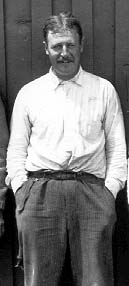Alfred Vincent Kidder
| Alfred V. Kidder | |
|---|---|

Alfred V. Kidder at Pecos, 1916
|
|
| Born | October 29, 1885 Marquette, Michigan |
| Died |
June 11, 1963 (aged 77) Cambridge, Massachusetts |
| Nationality | United States |
| Fields | archaeology |
| Alma mater | Harvard University (Ph.D)(1914) |
| Notable awards | Viking Fund Medal (1946) |
Alfred Vincent Kidder (October 29, 1885 – June 11, 1963) was an American archaeologist considered the foremost of the southwestern United States and Mesoamerica during the first half of the 20th century. He saw a disciplined system of archaeological techniques as a means to extend the principles of anthropology into the prehistoric past and so was the originator of the first comprehensive, systematic approach to North American archaeology.
Born in Marquette, Michigan, Kidder was the son of a mining engineer. He entered Harvard College with the intention of qualifying for medical school, but found himself uninspired by premedical courses. He applied for a summer job in archaeology with the University of Utah in 1907. Kidder spent two successive summers in the mesa and canyon country of southwestern Colorado, southeastern Utah and areas of New Mexico. Kidder and Jesse L. Nusbaum (later Superintendent of Mesa Verde National Park), came to the Mesa Verde area with ethnologist Jesse Walter Fewkes to conduct an archaeological survey and to photograph ruins. He obtained his bachelor's degree at Harvard in 1908 and a doctorate in anthropology in 1914.
Kidder then embarked on a series of expeditions to the Southwest, many in northeastern Arizona. These expeditions were sponsored by Harvard’s Peabody Museum of Archaeology and Ethnology and the associated Robert S. Peabody Museum of Archaeology at Phillips Academy in Andover, Massachusetts.
From 1915 to 1929, Kidder conducted site excavations at an abandoned pueblo near Pecos, New Mexico, now the Pecos National Historical Park. He excavated levels of human occupation at the pueblo going back more than 2000 years, and gathered a detailed record of cultural artifacts, including a large collection of pottery fragments and human remains. From these items, he was able to establish a continuous record of pottery styles from 2000 years ago to the mid-to-late 19th century. Kidder then analyzed trends and changes in pottery styles in association with changes in the Pecos people’s culture and established a basic chronology for the Southwest. With Samuel J. Guernsey, he established the validity of a chronological approach to cultural periods. Kidder asserted that deductions about the development of human culture could be obtained through a systematic examination of stratigraphy and chronology in archaeological sites. This research laid the foundation for modern archaeological field methods, shifting the emphasis from a "gentlemanly adventure" adding items such as whole pots and cliff dwellings to museum coffers to the study of potsherds and other artifacts in relation to the cultural history. Pioneering archaeologists in other regions of the United States completed the transformation of professional methodology initiated by Kidder.
...
Wikipedia
